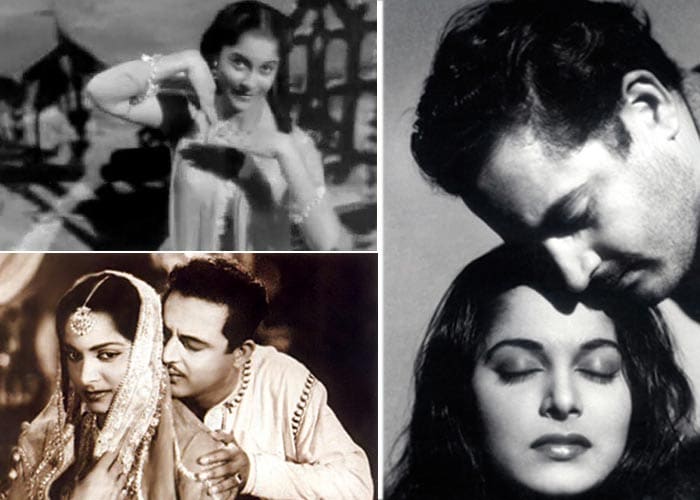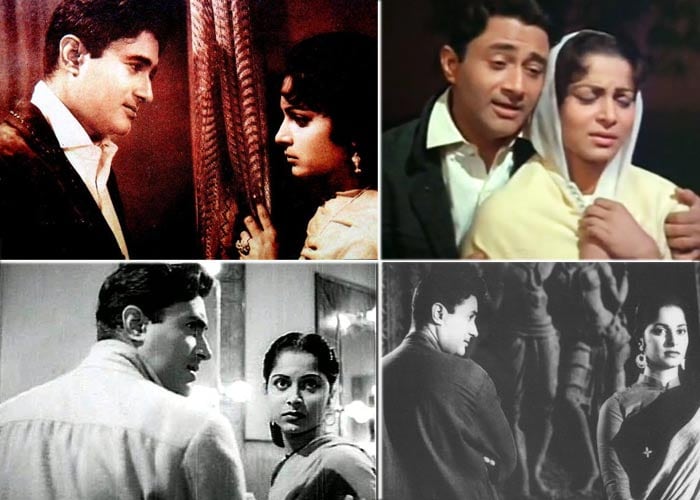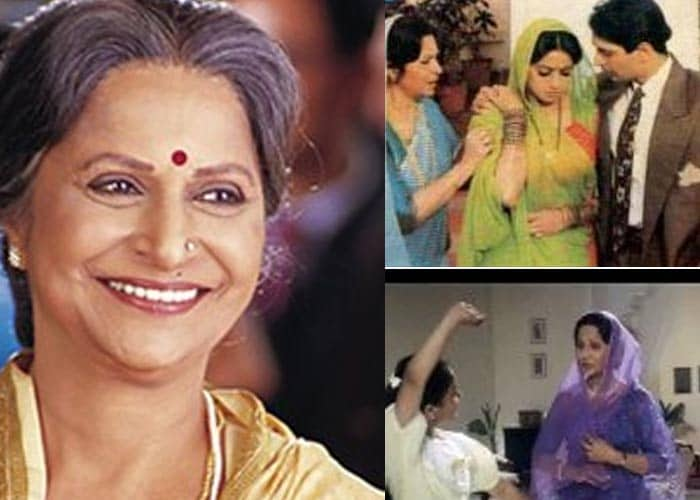
Waheeda Rehman, as charming as ever at 76, also feels "sorry" for the younger lot who she says are burning out because of multi-tasking.
- Waheeda Rehman, the star of ageless classics such as Guide and Kaagaz Ke Phool, feels the golden era of Indian cinema was not in her day but now when it is getting global appreciation and also evolving in terms of subjects, performances and technology.
- Waheeda Rehman, as charming as ever at 76, also feels "sorry" for the younger lot who she says are burning out because of multi-tasking.
- "People come up to me and say that when I did films, that was the golden era, but I don't agree with that. With our films getting appreciation abroad, I feel now is the golden era," Waheeda Rehman told IANS in an exclusive interview.
- "I feel actors burn out fast these days because they do too many things. Other than movies, they take up endorsements, stage performances, promotions, and it takes up so much of their time. I feel sorry for the fact that they have to do so much."
- Waheeda Rehman with Guru Dutt
- Before entering Hindi movies with the 1956 release C.I.D, Waheeda Rehman had been a part of successful Telugu and Tamil films like Jayasimha, Rojulu Marayi and Kaalam Maari Pochu.
- Then came unforgettables like Pyaasa, 12 O'Clock, Kaagaz Ke Phool, Sahib Bibi Aur Ghulam, Chaudhvin Ka Chand, Teesri Kasam and Mujhe Jeene Do - all landmarks in Hindi cinema.
- Waheeda Rehman, who has spent over five decades in filmdom, in what is now commonly known as Bollywood, feels the industry has changed for the better since her time.
- "There have been a lot of good changes - be it technically, or in terms of subjects and performances. There are very good movies made like The Dirty Picture, Kahaani, Black, Paan Singh Tomar and Peepli Live."
- Waheeda Rehman and Dev Anand in Guide
- "But there is too much of uncertainty too. Movies have become very expensive and fortunately for them, within a week they get back their money. But it is not a question of money; it is also about the quality of movie," she said.
- Waheeda Rehman also appreciated actors for playing all kinds of roles, something that was unheard of during her heydays.
- "In our times, even for a small negative role, people used to be like, 'I am a leading lady (so) how can I say this dialogue, or slap someone?'," she said.
- She never shied away from unconventional or bold roles. Guide is a case in point. The 1965 film, in which she was paired with Dev Anand, saw her playing a dancer who walks out on her husband to pursue her dreams to be a dancer.
- "I was very different. When a scene demanded an abuse or a slap, I used to do it. Actors were always conscious about their public image. They had complexes those days, but now they don't have, which is a good thing," she said.
- Waheeda Rehman in Lamhe
- Was she image conscious? "I was never conscious of this. I thought an actor should be able to do any role with conviction and sincerity. Script is the most important thing and if the script is good, then whatever role you are doing, it's fine," said the actress, who also excelled in character roles in Mashaal and Namak Halaal.
- After her appearance in Lamhe (1991), she retired from the film industry only to return after 11 years with Om Jai Jagadish in 2002 followed by Rang De Basanti in 2006; she was last seen in 2009 Delhi 6.
- An accomplished, talented dancer herself, the actress feels good dancing skills are important but not vital in current scenario.
- "For an actor, one doesn't have to be a dancer. But because our Hindi movies have so many song and dance sequences, it is preferred if they are good dancers. It's always advantageous to know dance. But if you don't, it's okay," she said.
- With the changing scenario, Hindi movies lack the element of classical dances. "It's not possible to have classical dances in the movie unless the subject demands so," she said, citing Guide and Umrao Jaan.
- "I don't like people dancing unnecessarily in the film, but it has become a part of movies nowadays. We Indians are musical- and dance-minded people. If a child is born or on a wedding, birthday, we dance. But when a song starts unreasonably, it irritates me," he said.
Did our AI summary help?
Let us know.
Mumbai:
Waheeda Rehman, the star of ageless classics such as Guide and Kaagaz Ke Phool, feels the golden era of Indian cinema was not in her day but now when it is getting global appreciation and also evolving in terms of subjects, performances and technology.
Waheeda Rehman, as charming as ever at 76, also feels "sorry" for the younger lot who she says are burning out because of multi-tasking.
"People come up to me and say that when I did films, that was the golden era, but I don't agree with that. With our films getting appreciation abroad, I feel now is the golden era," Waheeda Rehman told IANS in an exclusive interview.
"I feel actors burn out fast these days because they do too many things. Other than movies, they take up endorsements, stage performances, promotions, and it takes up so much of their time. I feel sorry for the fact that they have to do so much."

Waheeda Rehman with Guru Dutt
Before entering Hindi movies with the 1956 release C.I.D, Waheeda Rehman had been a part of successful Telugu and Tamil films like Jayasimha, Rojulu Marayi and Kaalam Maari Pochu.
Then came unforgettables like Pyaasa, 12 O'Clock, Kaagaz Ke Phool, Sahib Bibi Aur Ghulam, Chaudhvin Ka Chand, Teesri Kasam and Mujhe Jeene Do - all landmarks in Hindi cinema.
Waheeda Rehman, who has spent over five decades in filmdom, in what is now commonly known as Bollywood, feels the industry has changed for the better since her time.
"There have been a lot of good changes - be it technically, or in terms of subjects and performances. There are very good movies made like The Dirty Picture, Kahaani, Black, Paan Singh Tomar and Peepli Live."

Waheeda Rehman and Dev Anand.
"But there is too much of uncertainty too. Movies have become very expensive and fortunately for them, within a week they get back their money. But it is not a question of money; it is also about the quality of movie," she said.
Waheeda Rehman also appreciated actors for playing all kinds of roles, something that was unheard of during her heydays.
"In our times, even for a small negative role, people used to be like, 'I am a leading lady (so) how can I say this dialogue, or slap someone?'," she said.
She never shied away from unconventional or bold roles. Guide is a case in point. The 1965 film, in which she was paired with Dev Anand, saw her playing a dancer who walks out on her husband to pursue her dreams to be a dancer.
"I was very different. When a scene demanded an abuse or a slap, I used to do it. Actors were always conscious about their public image. They had complexes those days, but now they don't have, which is a good thing," she said.

Waheeda Rehman in Lamhe
Was she image conscious? "I was never conscious of this. I thought an actor should be able to do any role with conviction and sincerity. Script is the most important thing and if the script is good, then whatever role you are doing, it's fine," said the actress, who also excelled in character roles in Mashaal and Namak Halaal.
After her appearance in Lamhe (1991), she retired from the film industry only to return after 11 years with Om Jai Jagadish in 2002 followed by Rang De Basanti in 2006; she was last seen in 2009 Delhi 6.
An accomplished, talented dancer herself, the actress feels good dancing skills are important but not vital in current scenario.
"For an actor, one doesn't have to be a dancer. But because our Hindi movies have so many song and dance sequences, it is preferred if they are good dancers. It's always advantageous to know dance. But if you don't, it's okay," she said.
With the changing scenario, Hindi movies lack the element of classical dances. "It's not possible to have classical dances in the movie unless the subject demands so," she said, citing Guide and Umrao Jaan.
"I don't like people dancing unnecessarily in the film, but it has become a part of movies nowadays. We Indians are musical- and dance-minded people. If a child is born or on a wedding, birthday, we dance. But when a song starts unreasonably, it irritates me," he said.
Waheeda Rehman, as charming as ever at 76, also feels "sorry" for the younger lot who she says are burning out because of multi-tasking.
"People come up to me and say that when I did films, that was the golden era, but I don't agree with that. With our films getting appreciation abroad, I feel now is the golden era," Waheeda Rehman told IANS in an exclusive interview.
"I feel actors burn out fast these days because they do too many things. Other than movies, they take up endorsements, stage performances, promotions, and it takes up so much of their time. I feel sorry for the fact that they have to do so much."

Waheeda Rehman with Guru Dutt
Before entering Hindi movies with the 1956 release C.I.D, Waheeda Rehman had been a part of successful Telugu and Tamil films like Jayasimha, Rojulu Marayi and Kaalam Maari Pochu.
Then came unforgettables like Pyaasa, 12 O'Clock, Kaagaz Ke Phool, Sahib Bibi Aur Ghulam, Chaudhvin Ka Chand, Teesri Kasam and Mujhe Jeene Do - all landmarks in Hindi cinema.
Waheeda Rehman, who has spent over five decades in filmdom, in what is now commonly known as Bollywood, feels the industry has changed for the better since her time.
"There have been a lot of good changes - be it technically, or in terms of subjects and performances. There are very good movies made like The Dirty Picture, Kahaani, Black, Paan Singh Tomar and Peepli Live."

Waheeda Rehman and Dev Anand.
"But there is too much of uncertainty too. Movies have become very expensive and fortunately for them, within a week they get back their money. But it is not a question of money; it is also about the quality of movie," she said.
Waheeda Rehman also appreciated actors for playing all kinds of roles, something that was unheard of during her heydays.
"In our times, even for a small negative role, people used to be like, 'I am a leading lady (so) how can I say this dialogue, or slap someone?'," she said.
She never shied away from unconventional or bold roles. Guide is a case in point. The 1965 film, in which she was paired with Dev Anand, saw her playing a dancer who walks out on her husband to pursue her dreams to be a dancer.
"I was very different. When a scene demanded an abuse or a slap, I used to do it. Actors were always conscious about their public image. They had complexes those days, but now they don't have, which is a good thing," she said.

Waheeda Rehman in Lamhe
Was she image conscious? "I was never conscious of this. I thought an actor should be able to do any role with conviction and sincerity. Script is the most important thing and if the script is good, then whatever role you are doing, it's fine," said the actress, who also excelled in character roles in Mashaal and Namak Halaal.
After her appearance in Lamhe (1991), she retired from the film industry only to return after 11 years with Om Jai Jagadish in 2002 followed by Rang De Basanti in 2006; she was last seen in 2009 Delhi 6.
An accomplished, talented dancer herself, the actress feels good dancing skills are important but not vital in current scenario.
"For an actor, one doesn't have to be a dancer. But because our Hindi movies have so many song and dance sequences, it is preferred if they are good dancers. It's always advantageous to know dance. But if you don't, it's okay," she said.
With the changing scenario, Hindi movies lack the element of classical dances. "It's not possible to have classical dances in the movie unless the subject demands so," she said, citing Guide and Umrao Jaan.
"I don't like people dancing unnecessarily in the film, but it has become a part of movies nowadays. We Indians are musical- and dance-minded people. If a child is born or on a wedding, birthday, we dance. But when a song starts unreasonably, it irritates me," he said.

